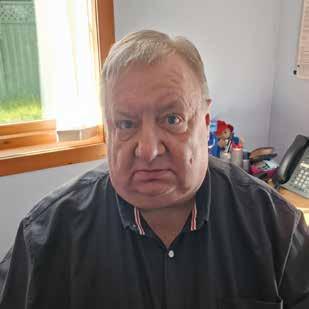
6 minute read
Listen up
‘Our Network, Our Future, Our Success’ was the theme of the annual conference, held in Cumbernauld. While celebrating the network’s achievements through recent national crises, the event also faced the network’s current challenges head-on.
As CAS CEO Derek Mitchell told the delegates: “There is no capability issue in our network… but we do face capacity challenges.” Workshops were devoted to practical solutions, as explored on pages 7-9.
Advertisement
The conference also saw a new chair appointed to the network – we find out what makes him tick on pages 10-11. Elsewhere, we focus on new initiatives and ways of working adopted by bureaux, despite current pressures, to make their services even more responsive.
Cover image shows former Deputy First Minister, John Swinney, delivering a keynote speech at the conference.
Keep in touch at voice@cas.org.uk to respond to articles, suggest new ideas, or share how your bureau or service is innovating to respond to clients’ needs.
As a speech and language therapist for 40 years, Janet Scott worked with clients living with conditions such as cerebral palsy and motor neurone disease.
“They would tell me about some of the difficulties they had making themselves understood in shops and as consumers,” she says.
Now retired, Janet has been a volunteer with Drumchapel CAB for five years – and she began to notice an odd gap in the bureau’s client base.
“I felt there was probably an underrepresentation of clients with communication difficulties making use of Drumchapel, and probably other bureaux,” she says.

Browsing the website of Communication Access – a charity that offers free training and standards on supporting people with communication difficulties – Janet noticed that the only accredited Scottish organisations were disability bodies and Jobcentres. She suggested to bureau staff that Drumchapel sign up.
Scotland’s first ‘communicationaccessible’ bureau is making it easier for anyone to have their voice heard.
Awareness training
The idea met with instant enthusiasm from session supervisor Fiona Temple, and learning and development coordinator Gillian Pollock. Gaining accreditation meant taking stock of the bureau environment, procedures and paperwork. All 20 staff and 38 volunteers also had to go through the four modules of awareness training provided by Communication Access.
The materials offer insight on interacting with people who have speech difficulties, problems processing information, or difficulties with reading and writing – for reasons that might range from hearing difficulties or autism to a history of stroke.
Accreditation took just a couple of months. The bureau is now able to advertise itself as ‘communication-accessible’ in its advertising and social media.
That’s just the start of the process, however –and it has acted as a trigger for new issues to be raised.
Extended interviews
“We’re now reviewing all our documents to make sure they’re simpler,” Fiona says. “It extends to
English as a second language too. For instance, we’ve had feedback that even interpreters find phrases like ‘household status’ hard to understand.
“We’re next door to a centre for young adults with communication needs, and also a day centre for older people – so we’ve been able to tap in to their suggestions.”
One critical change is revising the triage form, so that any extra communication needs are flagged up from the outset. “It means we can extend the interview slot, if needed, so advisers don’t feel under pressure to rush things,” says Gillian.

“We do hope we’re inclusive already – it’s part of our principles. But this is about taking the next step.”
Attitudinal change
What has not happened is Drumchapel’s investment in high-tech communication aids. Janet herself cautioned against this: “From my professional career, I was aware that almost as soon as you’ve managed to find the funds to buy a piece of kit, it’s out of date,” she says.
“A lot of the people I worked with had their own communication aids. They’re not generally looking for services to provide those.
“It’s more about an attitudinal change. I think it means we as a team are better equipped to provide a good service, regardless of people’s communication needs.”
In the village of Bonar Bridge, all eyes are on the local football team’s recent revival in fortunes. In nearby Dornoch there are high hopes for a business improvement district to lift the local economy. Meanwhile, Rogart residents are launching a bid to save their historic church. In a quieter way, the network has been making news in these communities too.
The three villages are among six which now benefit from weekly visits by advisers from the Golspie-based East and Central Sutherland bureau. The bureau carried out regular outreach sessions before the pandemic called a halt. But the new arrangements cover a wider area than before.


Left
Out
Bureau manager Phil Carr saw the move as essential to offer a proper service to rural citizens. Bonar Bridge residents, for example, face a 40mile round trip to visit the bureau, in an area poorly served by public transport.
“There are several big villages with populations of around 1,200, and some of them felt really left out,” Phil explains.
“People didn’t feel they could engage. They were ringing us and being told it could be four or five weeks before they saw anyone, so they weren’t bothering. We needed to do this.
“We spoke to the local MP and MSP, and word started to get out that we were looking to do this. Then other people started saying, ‘can you come and do our village too?’”
Open door
The relaunch of outreach was part of a wider “open door” policy introduced earlier this year.
In the hangover from Covid, the bureau had been operating on an appointments-only basis most days. Now it offers drop-in every day. In addition, it opens from 8am until 7pm on a Wednesday, and for two hours on a Saturday morning.
Phil arrived in post earlier this year after 10 years as a welfare rights adviser at Inverness, Badenoch and Strathspey CAB. He was met with instant enthusiasm when he proposed the service changes to the bureau team.

“Far from any opposition, the staff were very eager,” he says. “When I first arrived, we were dealing with about 95% of enquiries via email and phone. That’s now down to 70% and falling.”
New staff
The changes have been delivered by a very small team. Like other bureaux, East and Central Sutherland has had a “massive problem” finding volunteers since the pandemic. However, Phil credits a “particularly proactive” board, and accepts that his bureau was financially better equipped than many to support extended working.
“It’s quite expensive – the outreach alone costs us £6,000 a year – but we do get part funded for it,” he says. “We were in a position where we had scope to employ a couple more staff.”
Those new arrivals, Frieda Scholz and Kerry Hawthorne, now lead the outreach sessions on a job share basis. Other team members juggle shifts to ensure there are always two staff covering the extended bureau hours.
“We took a decision to do this and it’s worked for our client base, so we’re sticking to it, but we’ll reassess things in December,” Phil says.
Mobile service
He’s already thinking ahead, however. Following discussions with his chair, Ruwan UduweragePerera, the bureau is now in discussion to acquire a van, of the type used by banks to provide mobile rural services. “Taking room hire and mileage into account, we figure it would be cheaper in the long run,” Phil says.
When proposing the changes, Phil found himself repeatedly using the Biblical quote that was later used in the movie Field of Dreams: “If we build it, they will come.”
His confidence has been justified by clients’ reaction. And there’s been a further, unexpected bonus: the bureau’s higher profile has already attracted some much-needed new volunteer recruits.
Advice on the menu
Three days a week, Kerry Hawthorne runs Ardgay’s community tearoom, a haven for locals in the village and neighbouring Bonar Bridge. For the rest of the week, Kerry dispenses advice rather than home baking. She’s one of the local bureau’s new outreach advisers serving the villages around Golspie. With limited commerce in the area, the tearoom is popular. The new advice sessions are proving a big draw too: “People really appreciate it. We get busier by the week,” says Kerry.
She may be a newcomer to Citizens Advice, but Kerry is steeped in the local community: currently she’s preparing to support community lunches for Remembrance Day and Christmas.
Approaching an adviser in such a close-knit locality is not an issue, she believes. “People aren’t fazed: they know and trust Citizens Advice, and they know that if they come to us, that’s completely confidential.”
In fact, it’s Kerry’s job-share colleague, Frieda Scholz, who covers the Bonar Bridge session. “I’ve invited Frieda to the tearoom for lunch after her shift,” says Kerry.





